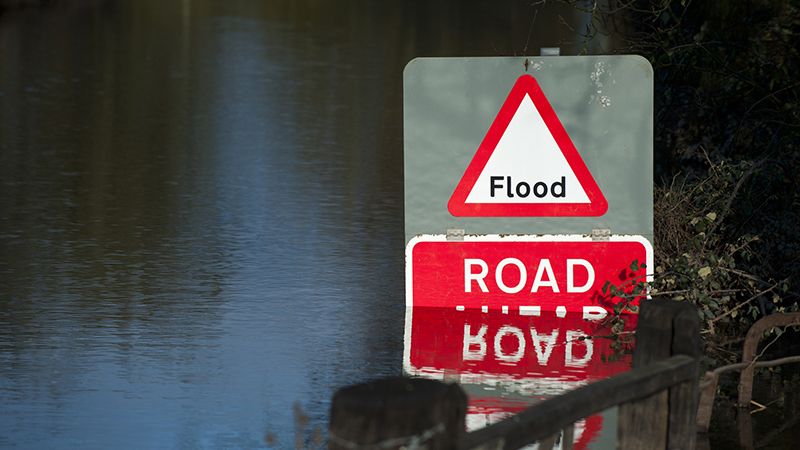Climate change is already threatening lives and livelihoods, with negative impacts on communities, businesses and the UK’s economic outlook only set to grow, according to the latest report published by the Climate Change Committee (CCC).
The report, which assesses the extent to which the UK’s Third National Adaptation Programme (NAP3) and its implementation are preparing the UK for climate change, found the delivery of effective adaptation remains limited and, despite some progress, planning for adaptation continues to be “piecemeal and disjointed”.
The vast majority of assessment outcomes have the same low scores as in 2023, and, in terms of adaptation delivery, “we do not find evidence to score a single outcome as ‘good’”, as adaptation progress is “either too slow, has stalled or is heading in the wrong direction”.
Also read: Challenging the trade-off misconception between adaptation and mitigation
For example, over half of England’s top-quality agricultural land is at risk of flooding today, with a further increase in total agricultural land at risk expected by 2050. Climate change also poses a major threat to UK biodiversity, at a time when it is degrading rapidly.
Elsewhere, 6.3 million properties in England are in areas at risk of flooding from rivers, the sea and surface water. This is predicted to rise to around eight million (one in four) by 2050, with steadily rising sea levels at the UK’s coasts increasing the risk of coastal flooding and exacerbating coastal erosion.
These and other future damages are likely to hamstring the government’s growth ambitions unless action is taken now, with Baroness Brown, chair of the CCC’s adaptation committee, offering a stark assessment of the situation: “Unchecked climate change could cost around 7% of economic output by 2050, creating challenges for driving sustainable long-term growth across the country.
“It’s a disappointment that we have not seen a step change in the country’s approach to adapting to climate change since last year’s change of government. We are also not seeing it prioritised in the devolved administrations. To date, no government in the UK has taken this risk seriously enough.”
Concern about climate change
Public concern about climate change is high. An Ipsos survey earlier this year found three quarters (72%) of Britons stated they are concerned about the impact of climate change on the country, and nearly two thirds (61%) agreed with the statement that “if individuals like me don’t act to combat climate change, we will be failing future generations”.
Investors also share public concerns on the UK’s lack of preparedness, contributing to the UK’s growth woes. A recent E3G survey found 82% of UK-based institutional investors are worried about the impact of climate-related risk on their portfolios, with 40% having sold or reduced holdings due to exposure to climate-related risks. Additionally, 76% of investors said they would invest more in the UK if climate-related risk were lower.
Joe Dillon, policy adviser at E3G, commented: “The UK is now seeing devastating impacts from climate change. Lives, livelihoods and economic growth are at risk while political parties’ action falls far behind public expectations. The government must step up and – in collaboration with the private sector and civil society – develop a whole-of-economy plan for climate to protect local communities, businesses and the economy. Voter and business concern and appetite for action is high and will only grow as impacts worsen.”
Meanwhile, writing on LinkedIn, Claire Jones – partner at Lane Clark & Peacock – said: “With the increasing evidence that climate change will be earlier and more severe than we thought, and the decreased likelihood of reaching net zero emissions by 2050 following the change in US administration, the importance of adapting to climate change has never been higher. However – as this report underscores – we just aren’t ready for the changes that are coming.
“This means that asset owners and asset managers need to place much more emphasis on the physical risks of climate change, alongside their existing emphasis on transition risks and net zero targets.
“Measuring physical risks is hard, but that’s not an excuse for inaction. We need to do the best we can with the information currently available and accelerate the collection of better information.”
Four key areas of action
The CCC recommended four key areas of action to raise the profile of adaptation across government and drive a more effective response to the UK’s changing climate.
As a “vital” first step, the CCC urged the government to improve objectives and targets to provide an actionable and measurable framework. As part of this, the government “must communicate clearly the respective roles of government, the private sector and households in delivering and funding adaptation”.
Adaptation and climate risks “are still only weakly integrated with wider government resilience efforts” and other key policy agendas, the CCC said, with greater coordination across activities, spending decisions, sectors and departments required. Government adaptation efforts must be better linked with wider resilience planning to ensure that adaptation becomes a true cross-government priority.
The next Spending Review was earmarked as a watershed moment to ensure that climate adaptation planning is supported with sufficient resources across government. Public assets and critical public services such as the NHS “need to be resilient to current and future weather so that they can operate effectively”, and in the case of new infrastructure, without costly retrofitting, the CCC stated. Therefore, the government’s policy agenda “can help to close key policy gaps identified in this report”, but only if climate resilience is adequately incorporated into their forthcoming strategies and plans.
Finally, the CCC recommended adequate monitoring and evaluation, underpinned by regular data collection and reporting, as “essential” to tracking climate impacts and the effect of adaptation measures at a national level. It is also needed to ensure that future planning learns from what is effective. The long-standing gap in an effective monitoring and evaluation framework for adaptation “must finally be closed”.








